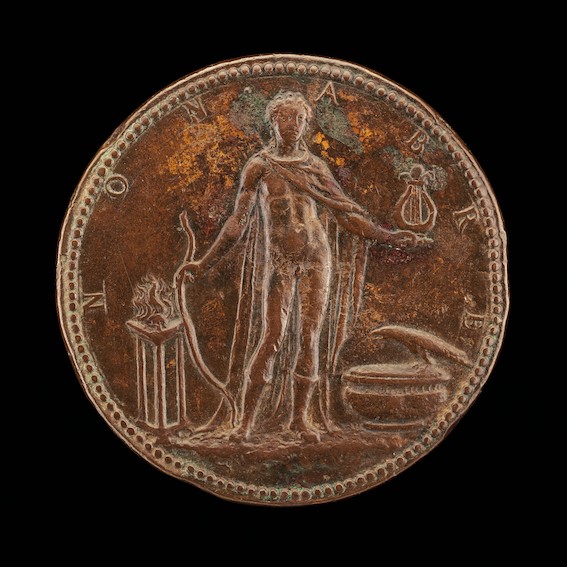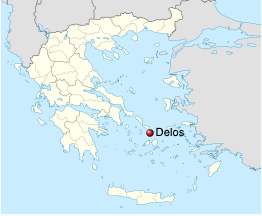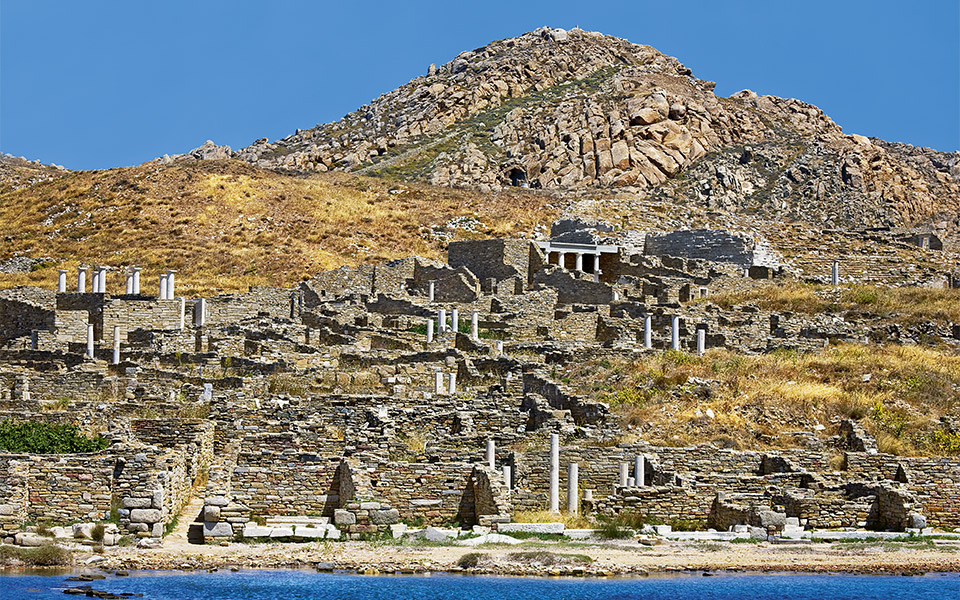
Have you heard it declared that no-one would make up a story about Jesus coming from such a nothing-back-of-the-woods place as Nazareth? No, no, the argument goes — if anyone were to make up a story about Jesus they would have impressed their readers by having him hail from some place of renown.
I don’t recall off-hand what led me into reading an obscure French work from 1927 about Pythagoras, but that work in turn led me to once again pick up the Homeric Hymns of all things. This time a light flashed above my head: I found myself confusing the goddess Leto with Mary urgently looking for a place to give birth to her child and finding nowhere … except a humble stable! And Nazareth — how could a messiah possibly come from Nazareth?
“Nazareth! Can anything good come from there?” Nathanael asked. — John 1:46
Now before you roll your eyes a second time let me explain. I am NOT saying that the story of Jesus’s humble origins are a direct, intertextual creation inspired or shaped by the Homeric Hymn to Apollo. What I am saying is that the idea of a great divinity having a very humble earthly beginning was a motif, a trope, a concept, an idea that was part of the cache of ancient Greco-Roman culture. (A quick persusal of some chapters in The Reception of the Homeric Hymns did persuade me, though, that the hymns were certainly part of the collective knowledge of literate persons in the first and second centuries of this era.)
Let’s have a look at the passage of interest in Hymn 3, to Apollo, as translated by Michael Crudden.
The hymns begins with a picture of all gods on Olympus rising up in awe when the great Apollo enters, all except for his father and mother, Zeus and Leto.

Next, Leto is called the blessed one for having given birth to such a mighty son. Apollo is called a “joy for mortals”. The poet ponders where to begin his tale and decides to sing of the time of Apollo’s birth on the island of Delos.
The time came for Leto to give birth and we read of her traveling a great distance to find the appropriate place, at least a welcoming one. She traversed populous Crete, and the countryside of Athens, and Aigina’s isle . . . .
And, famed for its ships, Euboia; Aigai, Eiresiai too,
And, near to the sea, Peparethos; Athos the Thracian height,
And the topmost peaks of Pelion; Samos the Thracian isle,
And the shadowy mountains of Ida; Skyros, Phokaia too,
The precipitous mount of Autokane; Imbros the firm-founded isle,
And mist-enshrouded Lemnos; holy Lesbos—the seat
Of Makar, Aiolos’ son—and Khios that lies in the sea,
Sleekest of isles; rugged Mimas, and Korykos’ topmost peaks;
Dazzling Klaros too, and sheer Aisagea mount;
Samos with plentiful waters, precipitous Mykale’s peaks;
Miletos, Kos—the city where dwell the Meropes folk —
Precipitous Knidos too, and Karpathos swept by the wind;
Naxos, and also Paros, and rocky Rhenaia tooOver so great a distance in labour with him who shoots
From afar [Apollo was an archer] went Leto, seeking whether amongst these lands
There was any that would be willing to furnish her son with a home.
But there was no room at the inn….
But they trembled much in fear, and not one dared, despite
Her rich soil, to welcome Phoibos [a name for Apollo], until queenly Leto set foot
Upon Delos
The rich and famous chose not to welcome Leto and her son-to-be.

Leto plaintively asked Delos….
and, questioning her, gave voice to winged words:
‘Delos, would you be willing to be the seat of my son,
Of Phoibos Apollo, and furnish him with a rich shrine on your ground?’
But how did Delos compare with all the above that Leto had just passed through? Leto said to Delos,
you’ll not, I think, abound in cattle or flocks, nor will you bear corn or grow an abundance of trees.
And Delos knew it well enough and said in reply:
‘Most glorious Leto, daughter of mighty Koios, I would
With pleasure welcome the birth of the lord who shoots from afar,
For in truth in men’s ears I am of dreadfully grim repute,
But in this way might gain great honour.
Delos’s inferiority complex over her stony, barren appearance got the upper hand, though, so she poured out her fear:
. . . . this dreadful fear
Pervades my mind and heart, that, when [Apollo] first sees the Sun’s light,
Holding the isle in dishonour—since stony indeed is my ground—
He may with his feet overturn me and thrust me under the sea.
There always great waves without ceasing over my head will break,
While he will reach some land that is pleasing to him . . .
. . . But the many-footed beasts
And black seals will make their lairs upon me, homes that will be
Secure for lack of people.
Fear not, Leto reassured Delos. First, with the promise that Delos would become the most famed central sanctuary in all of the Greek world and beyond:
. . . But if you possess a shrine
Of Apollo who works from afar, all humans, assembling here,
Will bring you their hecatombs: vast beyond telling the steam of fat
Will always be shooting upward, and those who possess you you’ll feed
From a foreigner’s hand, since there is no richness beneath your soil.’
And finally with an oath declared that Delos would have honour above all other isles.
‘Now let the Earth know this, and also broad Heaven above,
And the down-dripping water of Styx, which is the blessed gods’
Greatest and most dread oath: here Phoibos will always have
His fragrant altar and precinct, and will honour you above all.’
Isodore Levy, author of that book on the influence of the legend of Pythagoras in the Greek and Jewish worlds, was drawing quite different links with the gospels, between Apollo and Jesus. But they can wait for another post. I found the above of most interest for now. Never again will I allow anyone to get away with trying to say that Jesus really did have to come from Nazareth because no-one would make up a story about a god-man (or a figure near enough) coming from some place of no reputation.
Crudden, Michael. The Homeric Hymns. Oxford ; New York: Oxford University Press, 2001.
If you enjoyed this post, please consider donating to Vridar. Thanks!

Good point, Neil. However, it is not even necessary to go so far as to search out literary precedents. Whenever you hear an argument such as that “if anyone were to make up a story about Jesus they would have impressed their readers by having him hail from some place of renown” –and therefore the story is not made up– it is obvious you’re dealing with a sophistical, tendentious argument. The first proof of it is in the theme from the Gospels themselves that “the first shall be last, and the last shall be first.” This theme is not reinforced by an impressive birthplace or background.
You don’t even have to look past the Old Testament. David had a humble birth in a backwoods town called Bethlehem.
It’s not a very persuasive argument to me that ‘no one would write a character that _________’. People are creative and sometimes new situations are dreamed up by story tellers.
There was a story in the papers here recently where a man was refused parole because he continues to say he is innocent. All the evidence from 35 years of forensic development since he was locked up suggests that in fact the cause of death was natural. The Crown continues to insist that the circumstantial evidence is strong.
It is unlikely that someone would invent a god that comes from a little place like Nazareth. Yet, the “little place” has no evidence at all of existing in the time given. Like our unfortunate prisoner locked up for evidence that he *could* have committed a crime that didn’t happen, Jesus’ existence is justified by the supposed obscurity of a place that wasn’t there.
why do you say Nazareth was “a place that wasn’t there”?
Aside from the fact that the original Greek isn’t even very clear that it’s talking about a place called Nazareth, the place normally picked as being Nazareth has, despite a lot of effort, never produced any archaeological evidence that would stand up in court that it was anything more than – at absolute best – a farm. It certainly wasn’t a town or a city; it definitely had no synagogue. It’s about as real as the Garden of Eden.
Ironically, if it was really so obscure why would anyone know that it had a reputation for nothing good coming from it? Being obscure largely consists of *not* having a reputation.
But the author of the fourth gospel, writing a hundred years after the supposed events, neither knew nor much cared what Nazareth was. He’d seen the word (or a similar word, or several similar words) connected with the character of Jesus and spun a little story-teller magic around it.
My memory seems to be telling me that after the war of 66-70/73, Pharisees and others did migrate en masse north to Galilee and the town of Nazareth was then revived. By the time the gospels were being written the town did exist and, at least for Matthew, it sounded like a good fit for the word play he uses on it. There are reasons for thinking the name Nazareth was not part of the original gospel of Mark.
Well, as an alternative, that could be used to show that Apollo existed too… It’s only that we have lost the knowledge about the real person that lies behind the myth of Apollo. I’m joking, of course, I am continuously being surprised by the creativity of hard-core believers 😊
Yes – Written in Greek, by Greeks, for Greeks to read. First rule of getting published is “know your audience”. That’s why so much of the Gospels (especially the longer ones) are based on existing Greek storylines. The opening scene of Prometheus Bound, where the saviour of mankind is crucified and even has his torso pierced in the process tells you nearly everything you need to know about the origins and veracity of the Gospel story.
Beyond Prometheus, may other well known Greeks appear in thin disguise, including Socrates and Oedipus.
An important socio-political purpose of the Gospels is to lift up the lowly. That’s what the Beatitudes are about. That’s why Nietzsche considered Christianity a slave religion. Historians of early Christianity say the religion first took hold among the lower classes, slaves and peasants. (Later, when it became the official religion of the Roman Empire, things changed, and it could be forced on people against their will, but that’s the history of Europe and America.) The point is, when we see a dumb rationale like the one above, we’re dealing with someone who doesn’t understand the text he or she is supposedly reading.